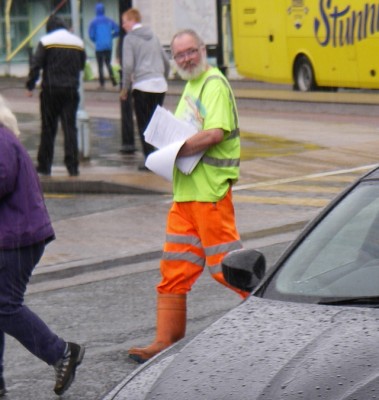A laughing hoax caller who sent a lifeboat on a ‘wild goose chase’ has been jailed for four months.
Alasdair Maxwell Munro, 55, was found guilty at Portree Sheriff Court of making a hoax call to HM Coastguard which cost the emergency services thousands of pounds to investigate.
The RNLI Mallaig lifeboat with a crew of seven volunteers spent almost three hours at sea in worsening weather conditions at night in a bid to find a yacht which Mr Munro had claimed was in trouble in Loch Hourn.
But no yacht was found, no one was in need of help and Munro’s actions then led to a lengthy judicial process which finally ended in court where he was found guilty after a two-day trial.
Police, coastguard officers and the RNLI were called to give evidence at the trial where Munro conducted his own defence.
Sheriff James Scott told widower Munro, of Kyleakin: ‘To be responsible for a false call leading to a lifeboat to be launched in weather conditions far from ideal is a very serious matter.’
The trial heard that Munro was laughing when he made the malicious alarm on 30 October, 2013 – and he also laughed in court which led to a reprimand from the sheriff.
The cost of the false call and the subsequent criminal proceedings runs into tens of thousands of pounds.
Mr Munro told the sheriff: ‘All I can do is to apologise for the inconvenience that has been caused.’
However, the RNLI warned that his reckless actions had wasted the time of a volunteer crew and wasted money donated by fundraisers.
The charity also had to be represented during the court proceedings and it had taken several attempts before the case was finally heard, nearly two years after the hoax call.
Richard Smith, the RNLI’s spokesman in Scotland, said: ‘The charity hopes that the sentence handed down by the sheriff leaves people in no doubt that the courts take hoax calls extremely serious.
‘This was a highly irresponsible act by Mr Munro. Our volunteer crew at Mallaig were sent out on what was effectively a wild goose chase. Our resources were spent on a malicious call and, if a real distress call had been given elsewhere, then we would have had difficulty in attending it and the life of someone in genuine distress could have been at risk.
‘This false call took lifesaving resources away on a dark October night. Our volunteers selflessly gave up their time to help someone they thought was in trouble and this incident cost the charity valuable funds.
‘The RNLI will always respond to any request to help those in trouble at sea and, on occasion, there are times when a false call is made with good intent and we willingly go out and ensure no one is in trouble.
‘That is completely different from a malicious call in which someone picks up a phone, spins a story, sits back and waits for the emergency services to be sent out.’
He added: ‘What made matters worse was that this hoaxer denied the offence. So the emergency services had to go through a lengthy court process and then finally give evidence, taking them away from their normal lifesaving duties, before he could be jailed.’
Related articles
- Hoax call sparks search in gale force conditions
- Coastguard hoaxer fined £2,500
- Do you know this voice? Hoax call recorded
- Exmouth lifeboat scrambles for hoax call
- Behind the scenes with RNLI lifesavers
19 hoax calls in six years
RNLI figures reveal that in Scotland in a six-year period from 2009-14 there were 19 malicious calls. The total for the RNLI was 245.
In 2012 a 30-year-old man was jailed for 145 days after he said he was trapped on Cramond Island, near Edinburgh. Volunteer lifeboat crew had to be airlifted off the island in 50mph winds.
In 2011 In Shetland a teenager was given 200 hours community service after he falsely said a man had fallen overboard. He had been on a 12-hour drinking spree and later that day there was a genuine emergency for the Lerwick RNLI volunteers.




